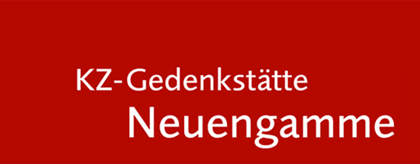02/25/2024 Exhibition
"Prisoners of the Neuengamme Concentration Camp from Ukraine" Installation
Two years after the start of Russia's war against Ukraine, the Neuengamme Concentration Camp Memorial will be showing drawings by Ukrainian artists Oliksandr Putivkiy and Roman Kolesnikov starting 24 February 2024. They illustrate memoirs of former Ukrainian prisoners of the Neuengamme Concentration Camp, Nadezhda Zueva, Anton Rudnyev, and Grigori Nedelko. The drawings were created in 2022 and 2023 and will be exhibited in booklets and as image projections in the foyer of the memorial’s main exhibition.
Svitlana Telukha, who is in charge of the project, describes the idea behind the exhibition:
"The idea is to make the stories of people who were deported from Ukraine to Germany for forced labour during the Second World War and whose fates are linked to the Neuengamme Concentration Camp more widely known and visible. Our project is based on audio and video interviews with Ukrainian survivors of the Neuengamme Concentration Camp from the memorial's archive. Together with the Kharkiv-based "Young Kharkiv" network, which consists of historians and artists, we have retold these stories from new perspectives by bringing together oral histories and drawings.
Life stories told in illustrations
We take the approach that life stories can be told in a special, evocative way with a graphic-visual approach to the memoirs. As "graphic stories," drawings not only make it possible to retell events visually, but to also get closer to the "heroes" and place their experiences in certain events. In our opinion, the combination of graphics and texts - the quotes from interviews with survivors - leads to an intense examination of the life stories and conveys a wealth of historical background in a condensed form.
For the project, we have selected the life stories of three Ukrainians who were deported to Germany for forced labour as young people. After attempting to escape or resisting the Nazi regime, they were imprisoned in concentration camps. They survived imprisonment under the harshest conditions and were later able to tell their stories. Their accounts revive the diverse social experiences that characterised the pre-war years in Ukraine, including repression under Stalin in the 1930s, the Holodomor of 1932-1933, and the beginning of the Second World War and the occupation of Ukraine. In the stories, we find references to both the Holocaust and various forms of Nazi forced labour.
Their stories illustrate the varied routes in which forced labourers and prisoners moved in occupied Europe, they tell of food and constant hunger, they contain information about underground activities, friendship, and mutual help, survival and adaptation strategies, liberation from the camps, and the difficulties of returning home.
Illustrated memories create a memory of the city of Kharkiv
Our artists brought their own artistic approaches and visions to the images of our "heroes," using different graphic styles and materials. The results are illustrations that attempt to reflect the individual experiences of the protagonists. The artists have each approached the topic with great respect and sensitivity and through tracing the stories in their drawings, have also passed on their own experiences of war. Each illustration is unique in its drawing style, composition, and colouring based on particular elements in the accounts of the former prisoners. Some illustrations were produced on tinted paper. Various materials - pencils, felt-tip pens, and gouache - were used.
One of the aims of our "Young Kharkiv" network is to create a kind of memory of the city of Kharkiv from various documents and to commemorate the history of the city and its inhabitants. Two of the prisoners featured in the project - Anton Rudnyev and Grigori Nedelko - come from Kharkiv, while Nadezhda Tsueva comes from Mykolaiv, which is now occupied by Russia. Anton Rudnyev still lives in Kharkiv today and is experiencing a second war at the age of 98.”
Installation at the Neuengamme Concentration Camp Memorial
The installation, in both German and Ukrainian, is expected to be on display at the Neuengamme Concentration Camp Memorial until 23 June 2024. Exhibition talks with Svitlana Telukha will take place on 19 May and 23 June 2024. For current programming and further information, please check our events calendar (in German).
This project was supported by the Liebelt Foundation Hamburg.
Support network for survivors of Nazi persecution in Ukraine.

![[Translate to English:] Eine ländliche Umgebung mit einfachen Häusern, einer Katze, zwei Personen und landwirtschaftlichem Gerät. Am Himmel drei Flugzeuge. Bleistiftzeichnung](/fileadmin/_processed_/8/c/csm_Grigori_Nedelko_c_Roman_Kolesnikov_klein_01b8381ca2.jpg)
![[Translate to English:] Zwei Zeichnungen, oben ein Soldat mit einem Tablet und einer Flasche darauf, daneben drei sitzende Frauen. Unten ein Soldat hinter einem Tisch, vor dem Tisch eine Schlange von Frauen, im Vordergrund eine Frau in Häftlingsuniform.](/fileadmin/_processed_/6/8/csm_Nadeschda_Zuewa_c_Oliksandr_Putivskiy_a0eb1a3779.jpg)
![[Translate to English:] Drei Zeichnungen: Oben Männer mit Gewehren, im Hintergrund schemenhaft andere Menschen. Mitte: ein Junge, der einem Mann zuguckt der Schweißerarbeiten macht. Unten: Jemand, der die die engegengesetzte Richtung einer Mauer oder eines Tores rennt, oben am Himmel der Mond](/fileadmin/_processed_/6/6/csm_Anton_Rudnjew_c_Oliksandr_Putivkiy_2bd66f92cd.jpg)